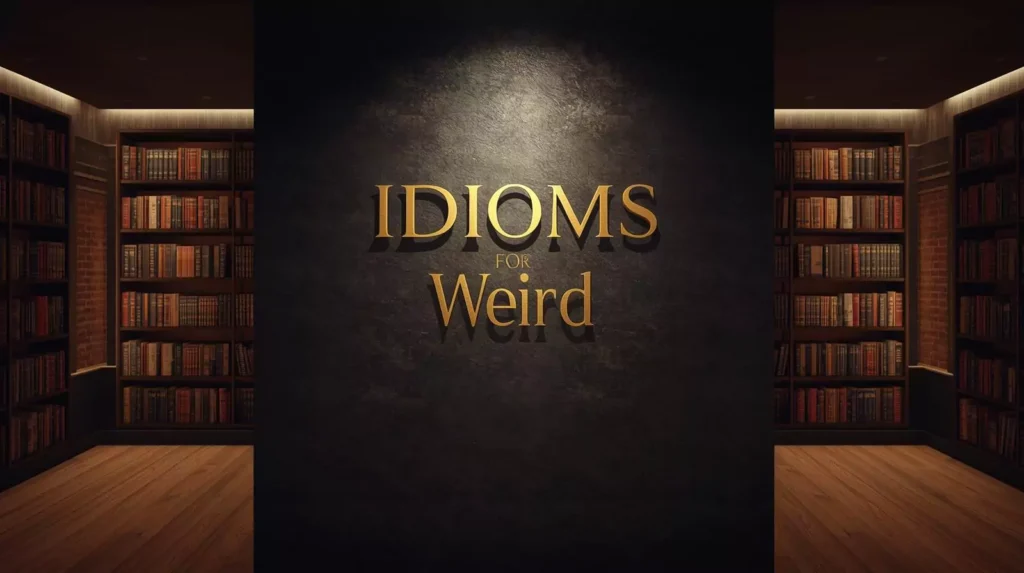Idioms for Weird – Strange and Unusual Sayings in English

When it comes to describing something unusual or out of the ordinary, ordinary words like “weird” often fall short. That’s where idioms shine because they allow us to capture the strange, the unexpected, and the downright peculiar in a way that’s both engaging and memorable. For native speakers, idioms feel natural but for learners, they can be puzzling, like inside jokes you were never told. Phrases such as “let the cat out of the bag” or “beat around the bush” may raise eyebrows at first, but once understood, they bring everyday speech to life.
What Are Idioms for Weird?
Idioms for weird are expressions in English that describe something unusual, strange, or out of the ordinary. These phrases often don’t make sense if you look at the literal words, yet they carry meanings that help us capture the feeling of odd situations, surprising behaviors, or quirky events. For example, instead of just saying “that’s strange,” a native speaker might say “it’s not all there” or “something fishy is going on.” Both expressions point to something weird, but they add personality, imagery, and even humor to the description.

Commonly Used Idioms for Weird
- Out of the ordinary – Something unusual.
Example: Her dress was really out of the ordinary at the party. - Fish out of water – Feeling uncomfortable in an unfamiliar situation.
Example: I felt like a fish out of water at the opera. - Something fishy – Something suspicious or odd.
Example: There’s something fishy about his excuse. - Not all there – Someone acting strangely or irrationally.
Example: He’s nice, but I think he’s not all there. - Off the wall – Unusual, eccentric, or unexpected.
Example: That comedian’s jokes are really off the wall. - Out of left field – Completely unexpected or strange.
Example: His question came out of left field. - Stranger than fiction – So weird it’s hard to believe.
Example: The events of last night were stranger than fiction. - Like a square peg in a round hole – Something or someone not fitting in.
Example: She feels like a square peg in a round hole at work. - Not playing with a full deck – Someone not thinking clearly.
Example: That guy is not playing with a full deck. - Mad as a hatter – Completely crazy or weird.
Example: The inventor seemed mad as a hatter. - Gone round the bend – Acting irrationally.
Example: He must have gone round the bend to believe that. - One sandwich short of a picnic – Slightly crazy or strange.
Example: She’s a bit one sandwich short of a picnic. - A bit cuckoo – Acting oddly or weird.
Example: My neighbor is a bit cuckoo. - Living in la-la land – Out of touch with reality.
Example: He’s always living in la-la land. - Like something the cat dragged in – Looking weird or messy.
Example: You look like something the cat dragged in. - As odd as two left shoes – Very strange.
Example: His explanation was as odd as two left shoes. - Not the sharpest tool in the shed – Weird or slow in thinking.
Example: He’s not the sharpest tool in the shed. - Up the wall – Driving someone crazy.
Example: The noise is sending me up the wall. - Like a bull in a china shop – Acting awkwardly or weirdly.
Example: He’s like a bull in a china shop when nervous. - A bit off – Not normal or slightly weird.
Example: Something feels a bit off about her story. - Not right in the head – Strange or crazy.
Example: That man is not right in the head. - Eccentric to a fault – Overly strange or unusual.
Example: The artist was eccentric to a fault. - Like a UFO sighting – Rare and weird.
Example: His sudden appearance was like a UFO sighting. - Like a sore thumb – Stands out in a weird way.
Example: His outfit stuck out like a sore thumb. - A nutcase – Someone very strange.
Example: He’s a complete nutcase. - Screw loose – Acting oddly.
Example: She must have a screw loose. - Weird as it gets – Extremely strange.
Example: That was weird as it gets. - Like a ghost town – Strange emptiness.
Example: The streets looked like a ghost town. - Like talking to a brick wall – Weirdly unresponsive.
Example: Speaking to him is like talking to a brick wall. - Odd duck – Strange person.
Example: He’s an odd duck but harmless. - Loony tunes – Acting bizarrely.
Example: The kids were loony tunes after the candy. - Out of whack – Not functioning normally.
Example: My computer’s acting out of whack. - Batty – A little crazy.
Example: She’s sweet but a bit batty. - Wacky – Odd in a fun way.
Example: That was a wacky performance. - Bent out of shape – Weirdly upset.
Example: Don’t get bent out of shape over it. - Like a circus – Chaotic and strange.
Example: The meeting was like a circus. - Goofy – Silly or weird.
Example: He has a goofy sense of humor. - Bonkers – Crazy or weird.
Example: That idea is absolutely bonkers. - Quirky – Unusual but charming.
Example: She has a quirky personality. - Flaky – Unreliable or odd.
Example: He’s too flaky to depend on. - Zany – Weirdly funny.
Example: The comedian’s zany jokes had us laughing. - Peculiar as a platypus – Very strange.
Example: His habits are peculiar as a platypus. - Nutty as a fruitcake – Extremely weird.
Example: That professor is nutty as a fruitcake. - Like a madhouse – Crazy environment.
Example: The shop was like a madhouse. - Like a freak show – Very strange scene.
Example: The gathering looked like a freak show. - Not making sense – Strange or confusing.
Example: His story is not making sense. - In another world – Weirdly distracted.
Example: She’s always in another world. - Like an alien – Very different or odd.
Example: He felt like an alien at the event. - Curious case – Something strange or puzzling.
Example: It’s a curious case indeed. - Beyond belief – Extremely weird or unbelievable.
Example: Her reaction was beyond belief.
Rare and Unique Idioms for Weird
- As queer as a clockwork orange – Unnaturally strange.
Example: The old painting looked as queer as a clockwork orange. - Crooked as a dog’s hind leg – Very odd or suspicious.
Example: That deal sounds crooked as a dog’s hind leg. - As odd as Dick’s hatband – Very peculiar.
Example: The ritual was as odd as Dick’s hatband. - Queer fish – A strange or eccentric person.
Example: He’s a bit of a queer fish. - As strange as a three-dollar bill – Obviously weird or fake.
Example: His smile seemed as strange as a three-dollar bill. - Off one’s rocker – Acting crazily.
Example: She must be off her rocker to say that. - Like a dog in church – Feeling awkward or out of place.
Example: He sat there like a dog in church. - As odd as an owl’s knees – Incredibly strange (rare).
Example: That’s as odd as an owl’s knees. - Queer as a nine-bob note – Something fake or suspicious.
Example: The accent was queer as a nine-bob note. - Like a cat in a room full of rocking chairs – Uncomfortable and weird.
Example: She looked like a cat in a room full of rocking chairs.
Weird Idioms in Literature and Pop Culture
- Down the rabbit hole – From Alice in Wonderland, meaning entering a strange or confusing situation.
Example: I went down the rabbit hole researching conspiracy theories. - Through the looking-glass – Another Lewis Carroll phrase for entering a weird world. Example: The plot felt like through the looking-glass logic.
- The Twilight Zone – From the TV show, meaning very weird or surreal.
Example: That town was straight out of The Twilight Zone. - Catch-22 – From Joseph Heller’s novel, meaning a no-win, absurd situation.
Example: It’s a Catch-22 to need experience to get a job but need a job to get experience. - Kafkaesque – From Franz Kafka’s works, meaning bizarre and oppressive.
Example: The bureaucracy felt Kafkaesque. - Big Brother is watching you – From Orwell’s 1984, weirdly oppressive surveillance. Example: The cameras made me feel like Big Brother is watching.
- Mad Hatter’s tea party – From Alice in Wonderland, meaning a chaotic, weird gathering.
Example: The meeting was like a Mad Hatter’s tea party. - Pandora’s box – From Greek mythology, meaning strange consequences once something begins.
Example: Asking that question opened a Pandora’s box. - Frankenstein’s monster – Weird creation gone out of control.
Example: The project turned into a Frankenstein’s monster. - Dr. Jekyll and Mr. Hyde – From Robert Louis Stevenson, describing weird dual personalities.
Example: He’s like Dr. Jekyll and Mr. Hyde after drinking.

Synonyms and Alternatives for Weird
| Synonym | Meaning |
|---|---|
| Strange | Unusual or surprising in a way that is hard to understand. |
| Odd | Different from what is ordinary or expected; peculiar. |
| Bizarre | Very unusual, especially in a striking or shocking way. |
| Quirky | Having unusual or unexpected traits, often in an appealing way. |
| Uncanny | Strange or mysterious, especially in a way that seems unsettling. |
| Peculiar | Unusual or not normal; distinctive. |
| Eccentric | Unconventional and slightly strange in behavior or style. |
| Freakish | Unnaturally strange, abnormal, or extraordinary. |
| Unusual | Not commonly occurring or done; remarkable or exceptional. |
| Outlandish | Looking or sounding very strange or unfamiliar. |
Tips for Using Weird Idioms in Writing and Speech
- Match the context – Use weird idioms where humor, creativity, or exaggeration fits; avoid them in overly formal settings.
- Explain for clarity – If your audience is not native English speakers, pair idioms with a short explanation so the meaning isn’t lost.
- Don’t overstuff – Sprinkle idioms naturally; using too many can confuse readers or sound forced.
- Use for imagery – Idioms about weird paint strong mental pictures (e.g., mad as a hatter), making your descriptions more vivid.
- Adapt tone – Choose idioms that match the mood: playful idioms (goofy as a clown) for lighthearted writing, or darker idioms (Kafkaesque nightmare) for serious themes.
Read: Idioms For Basketball
FAQs
Conclusion
The English language is full of colorful idioms that capture the strange, the unusual, and the downright weird in ways plain words cannot. From common sayings like “something fishy” to unique expressions such as “as queer as a clockwork orange”, these idioms give life and humor to our conversations. Learning them not only makes your vocabulary richer but also helps you sound more natural, confident, and even witty in English. Whether you’re writing creatively, speaking casually, or trying to understand native speakers, these idioms allow you to describe odd situations with flair.
